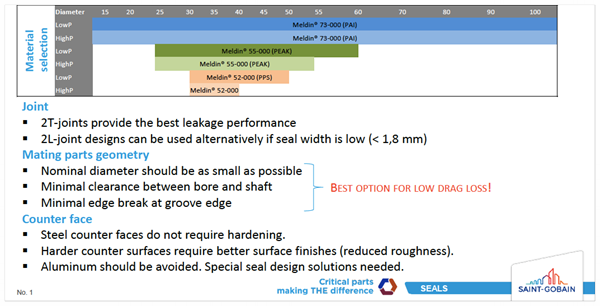High speeds, high pressures and high temperatures – these are three important requirements that seals in critical automotive applications frequently must be able to address. Rectangular seals, named after their rough rectangular shape, are a special type of face seal for rotating connections used in applications where pressurized oil or fluid need to be transmitted between a stationary and rotating part. They are used for the oil pressure supply in rotating actuators such as clutches and pistons in automotive transmissions as well as in engines and oil pumps. These seals are custom designed for use in internal applications to address high pressures above one bar and speeds at over five meters per second for high volume applications.
Rectangular seals add value as they save space and money. Often just millimeters wide, these seals accommodate pressures and speeds that often cannot be achieved by other options. They offer low drag torque or parasitic losses from friction (due to pumping/throttling, friction between piston rings and cylinders or other factors). They also provide low leakage performance and help to lower fuel consumption and emissions in engines and transmissions. Due to the flexible production process of these injection molded parts, they can be equipped with additional features such as fixtures or lubrication channels.
The specific rectangular seals that are made from Saint-Gobain Seals are chemically robust, high performance thermoplastics (e.g., Meldin® material and others), making them resistant to chemicals often found in automotive applications. Increasingly, rectangular seals are being used as an alternative to metal and other design options in high volume applications. How else are they being used and how can they help you?
Rectangular Seals Keep Automobiles Moving
Rectangular seals are used in clutches, oil pumps, and variable valve train applications in engines and all types of transmissions—from planetary automatic transmissions (AT), to continuous variable transmissions (CVT), dual clutch transmissions (DCT), dedicated hybrid transmission (DHT), and more.
With numerous transmission options today, the number of gears has reached seven for manual and up to 11 for automatic transmission. Seals used in these applications need to help convert available power from the engine into the needed speed and torque of the drivetrain, depending on the actual driving conditions. As such, seal components must be able to address high temperatures from frictional heat generated by operation and the fluids being pumped. Used for the oil pressure supply of rotating actuators like clutches and pistons in transmissions, rectangular seals are ideal since they are able to resist high speeds and pressures that cannot be sealed by radial shaft or other special types of lip seals. The seal design is also space saving, robust and leads to minimal friction losses.
In addition to being used in transmissions for conventional and self-driving vehicles, rigid, dimensionally stable, Meldin® rectangular seals are used in transmissions for high-end sport cars. A conventional automobile might require engine speeds of 6,000 RPM (maximum), temperatures reaching 248°F (120°C) and pressure needs of 15 to 20 bar. Rectangular seals in this application, however, must withstand engine speeds of 11,000 RPM, temperatures reaching 302-338° F (150-170°C) and pressure tolerances of 435 psi (30 bar). These seals are also relied on to ensure durability and lifetime service, as well as a secure precise fit to minimize oil leakage and increase fuel efficiency.
Growth in both full and part autonomous driving, where the vehicle controls its speed or direction without influence of the driver, has led to an increase in the number of automatic transmissions worldwide and higher demands and volume of rectangular seals.
A Leader in Rectangular Seal Development Standards
As a result of our more than 40 years of experience developing seals for the automotive industry, Saint-Gobain Seals was recently asked to develop a guideline for Tier 1 automotive manufacturer, Ford, to use in evaluating rectangular seals in the design and early stage of transmission development. Guidelines are important as they provide a practical framework for decision making so you are not starting from scratch, and because of our decades of design engineering experience, we have been requested to provide different types of guidelines such as the one to a key oil and gas customer for isolation valves.
The following is the one-page chart that was developed to help Ford as well as any other Tier 1 and Tier 2 companies who need guidance in selecting the best types of seal for their application.
As you can see in the illustration below, the recommended materials to use in development of rectangular seals is a factor of the diameter of the seal (shown along the top, x-axis) and whether low or high pressure is needed (on the y-axis). For instance, if you are looking to develop a seal with low pressure requirements that is 50 inches in diameter,
Meldin® 73-000 with polyamide-imide (PAI) might be used to provide superior mechanical properties at very high temperatures (up to 275°C) or Meldin® 55-100 could also be a good option, with superior thermal resistance, strong mechanical properties and chemical resistance.

The following are several considerations that also play a factor in seal selection. These three points offer the biggest opportunities to enhance performance when it comes to contact with these parts.
- Joints: Rectangular seals include a joint that can be opened and closed in the application to accommodate assembly, thermal expansion, moisture absorption and other factors. The leakage performance of these seals is dominated by precision of this joint. A 2T shaped design is recommended for best leakage results. With these “T-shaped” joints, there is less risk of the joint fingers blocking one another (the finger lengths in 2T joints are shorter than those in 2L and are more robust). The lower clearance between joint fingers in 2T joints enables the seal to reach lower leakage values. In certain applications, a 2L can also be used.
- Mating parts: For automotive suppliers looking for the best efficiency and low drag torque losses in seal performance, mating parts are also an important consideration. To reduce friction, automotive suppliers should strive to reduce diameter. Additionally, minimizing clearance between the bore and shaft and edge break at the groove’s edge can enable the application to leverage hydrostatic balance and force to lower drag torque.
- Counter faces: The seal’s wear can have a critical impact on the lifetime of the application. In many cases, the counter surface is the crucial component. Rectangular seals can run on non-hardened counter faces without any issues. Not having to harden surfaces will allow higher roughness values, and could be a cost saving for the manufacturer. However, if hardening is required for other purposes, e.g. if a bearing or a gear is located near the seal's groove, this will lead to improved surface roughness and thus create higher production costs.
While the trend in automotive is moving toward leveraging aluminum to save weight to reduce potential loses in acceleration and breaking, this material is also highly prone to wear. Meldin® 73-000 and Meldin® 55-000 high-performance plastics are hard and lightweight and can offer lower wear compared to aluminum. We urge Tier 1 and 2 companies who design with aluminum to reach out to Saint-Gobain Seals or other expert developers in advance to obtain the best seal options.
Because Saint-Gobain Seals has been providing cutting-edge expertise in design, tooling, testing and processing high-temperature polymers for the automotive industry since 1994, we are confident that we will be able to support your growing needs and solve your challenges, particularly in powertrain and transmission applications. With the acquisition of LS Kunststofftechnologie GmbH in 2013 and investment at its Wertheim headquarters, we have strengthened our position in this industry and are excited about designing innovative technology such as our rectangular seals so our automotive customers won’t be stuck on idle but driving competitively ahead.

